Interview: Sahar Mirhadi, Magic Player, Competitor and Mental Health Doctoral Researcher

Mental health in Magic: The Gathering is a growing conversation, and Sahar Mirhadi is a central voice. Both a competitive Magic player and a doctoral researcher in how video games can help us cope with difficult times, Sahar is passionate about advocating for mental health and wellbeing in gaming. Sahar describes that her interests in Magic and mental health have blended into one another. This culminated most recently in Sahar receiving a New Perspectives grant for MagicCon: Amsterdam, where Sahar hosted a panel on Magic and Mental Health. Wizards' New Perspectives Grant Program aims to support the inclusion of Magic players from historically underrepresented groups and provides assistance to attend MagicCon events.
We sat down with Sahar to talk about her perspective on MagicCons, Commander, mental health and more!
This interview has been edited for clarity and length.
What was your experience of receiving the New Perspectives grant for MagicCon Amsterdam?
The funny story is that I already knew about the programme at MagicCon Barcelona, because a friend, Josh, had applied to do it. When the time came around for Amsterdam, I was like, let me apply and let me see what happens. I wrote, some might say, a lengthy application about everything I'd done to help promote eternal formats and increase diversity and inclusion within those formats. And they seemed to like it and the rest is history.
The support I received was very useful. I will shout out Sameer Joseph who was our Project Manager as part of the Diversity, Inclusion and Equality team. The initiative came from the DEI team at Wizards to get people of marginalized genders and groups to attend MagicCon. Everyone was doing a myriad of things, but the one that stuck with me was a gentleman called Ismael from Brazil, who was teaching kids English through Magic. And I was like, what? I'm just trying to get more people to play Legacy and Vintage! You're teaching kids English? There's a myriad of stories that came from what people had given, how they had brought new perspectives to Magic, and I think it's an amazing initiative. Long may it continue!
Initially, it was location-specific, but now they've opened it globally, I think that it's a much better initiative. We had recipients from Canada, America, the UK, and Spain; it was a full smorgasbord of people. I think that's a testament to how global the game is and what people are doing.
For me, it was an opportunity to connect with people I probably wouldn't have connected with normally. And for me, that's cool. That's my big passion, reaching across the proverbial desk shaking someone's hand, and meeting people I wouldn't normally meet in my day-to-day life. I think that's the cool thing about Magic, that you get to meet people from all walks of life.
One of the coolest stories of the weekend was that I finally got to connect with Carmen Klomparens in real life. Carmen was my first ever Magic coach when I first started playing Modern in 2018. So to see her in person and spend time with her at the New Perspectives dinner, someone who has also championed diversity and inclusion in the game, was cool. For me, just having a group of people where our whole mantra, our whole bastion is to promote diversity and inclusion was so cool. Now I just have a whole group of people I can connect with globally.
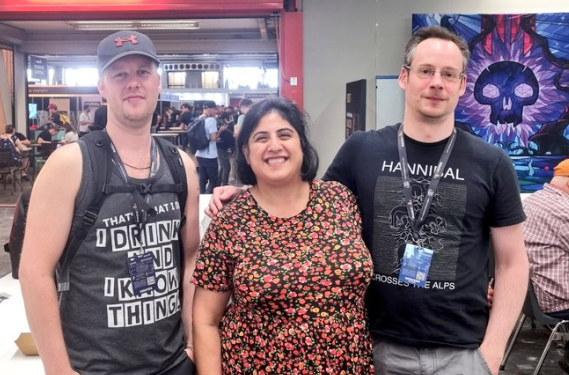
Sahar at MagicCon Amsterdam
What would you say to anyone considering applying for the New Perspectives grant?
Apply! What's the worst that happens? They say no. I know that's very blunt, but I've had friends who've said, "I don't know what new perspectives I've brought" and I've told them to just write down what they've done. I genuinely feel that if you have something to say, and you have helped build communities or have opened a door for representation or, in the case of Ismael, broken down barriers, whatever it may be, you should just apply.
Because there are only ten recipients and it's a global application, I wouldn't want people to get disheartened or feel that their contributions don't matter. Something we spoke about at the panel is that just because they say no to something doesn't necessarily mean that your input or your worth isn't important. It's still important and it still matters.
What thoughts do you have for someone who is struggling to find their place in Magic or struggling to find the confidence to take those first steps if they have an idea of what they want to do in the Magic space?
It's tough because I can say, as a natural extrovert, to just take up that space and be "more", but not everyone has that natural, as the kids call it, "rizz". I worked in sales and marketing for 12 years before I went into academia, so for me, it comes naturally. I would start by just affiliating yourself either with previous New Perspectives participants or people in your community who can help you develop your voice.
In the case of marginalized genders, there are two initiatives I've been part of and I'm now a collective member of. There's the VML, which is a tournament series. You have a league system, and the top 8 play for two invites to the Pro Tour. It's for players of marginalized genders, so there's the breaking down of barriers.
The second thing is the Birds of MTG collective. Their whole mantra is about breaking down barriers for people from marginalized groups and marginalized genders. I think by affiliating with those, if you feel you don't have that voice, you can find people who resonate with the message that you have. If you're doing it on more of a local or community level, find people who are those champions. Every community has those people. Talk to your peers, and if they are your friends, they'll help you articulate what you're trying to say and boost your confidence.
There's part of me that says, you have to take that step. Put the big girl pants on and just take that step forward. I've suffered from imposter syndrome as much as the next person and one thing I've learned about the Magic community is everyone wants to support you and cheer you on. But you have to be the person to take that step forward. I think there are enough people who will be your arbiters and support network that you can do that with confidence.
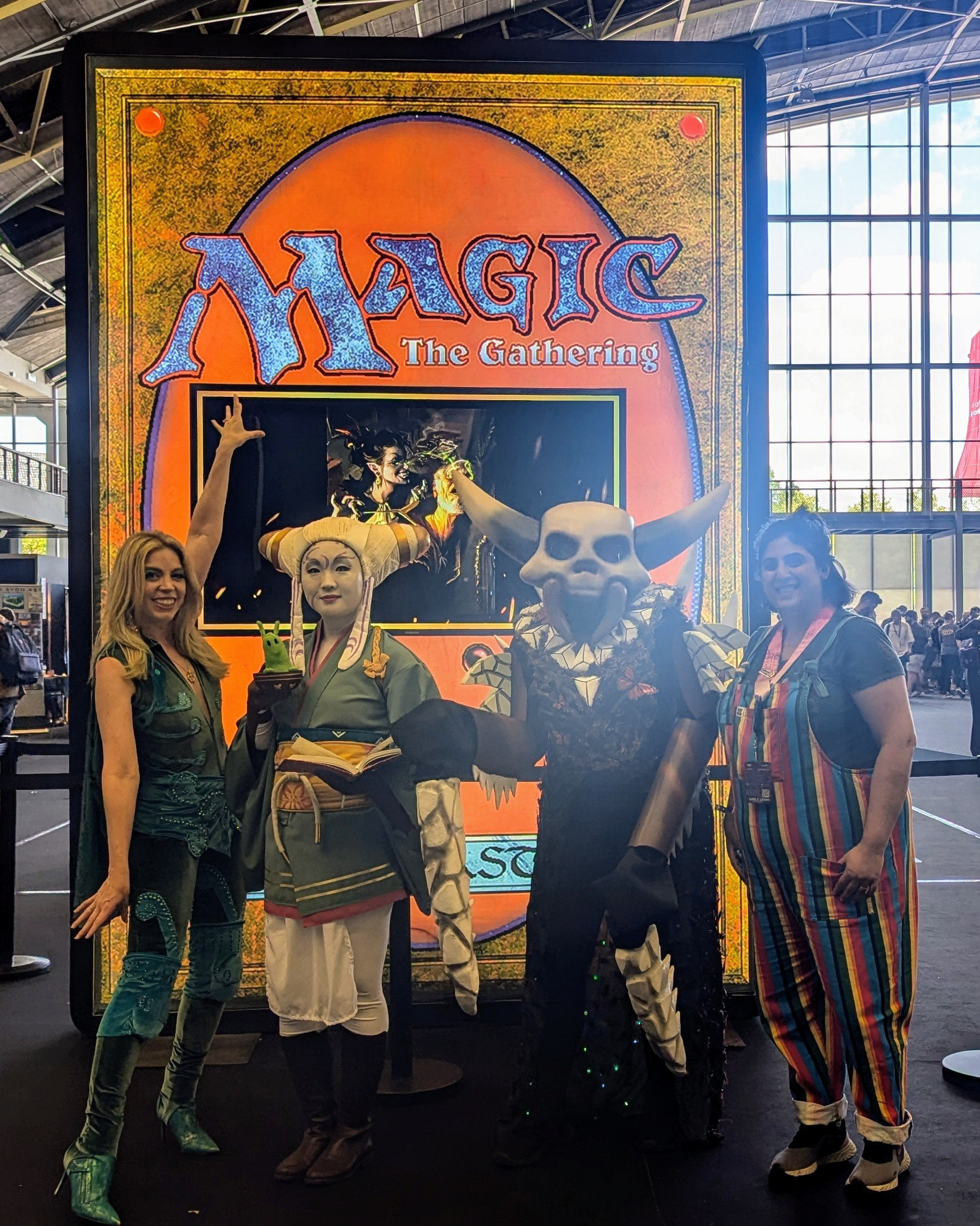
Birds of MTG Meet Up at MagicCon Amsterdam
What has finding community looked like for you in Magic?
I've been very fortunate. I'm someone where throughout my life I've not been afraid to say hello. I'm not afraid to say hey, you seem like someone I should talk to. I've had friends who have come and gone along the way. There have been times when I've misjudged or the person was only meant to be in my life for a reason or a season, not for a longer-term period. In the community I've cultivated I've purposefully found people around me that have the same passion or are responsive to my passion. I'm attracted to people who get excited about something as much as I do. There's something so magical about seeing someone get excited about the thing they love!
I'm curious about people, and when you're curious, people then get attracted to you. My energy is infectious, as other people have told me. I'm fortunate I can share that level of energy and enthusiasm with others.
What was your experience hosting a panel at MagicCon?
I saw Hobbes Q and Tron Is Bad on Twitter/X talking about the Better Days MTG initiative. Tron Is Bad has been on my podcast and YouTube channel The Legacy Gambit, talking about mental health generally. Hobbes has a background in therapy and academia. There are a few therapists, mental health practitioners, and psychologists who are also Magic players. And I was like, you know what, I think there's something here. I reached out to Andreas (@ecobaronen) first, who is also a Magic coach, and has a perspective on the game that I think is very unique. I then reached out to Daniel Cane originally. And then Emma, a big fan of Emma Partlow. It sort of fell in place: I had the academic perspective, Andreas had more of the competitive side, Emma had the content perspective, and Daniel had the more casual and wider mental health application.
In hindsight, I think the only thing I was missing was someone from a clinical perspective, one of the many Magic therapists, but many of them are based in the US. But that was fine because I didn't want to make it too academic or too clinical. I felt that I could at least bring some of my insights. For a general audience, I feel if people can understand some of the insights you're saying because they've lived through it, that's way more helpful than bringing a clinical perspective. Sometimes a clinical perspective works and sometimes it doesn't.
In the end, I was happy with what we worked with and I'm proud of the piece of content we ended up achieving. I've had subsequent feedback from people who have said it's impacted the way they see things and the panelists and myself articulated the Magic and mental health journey. It's hard for people, especially tying your self-worth to results which is a big one. I'm glad we covered that, plus a multitude of other things we also covered.
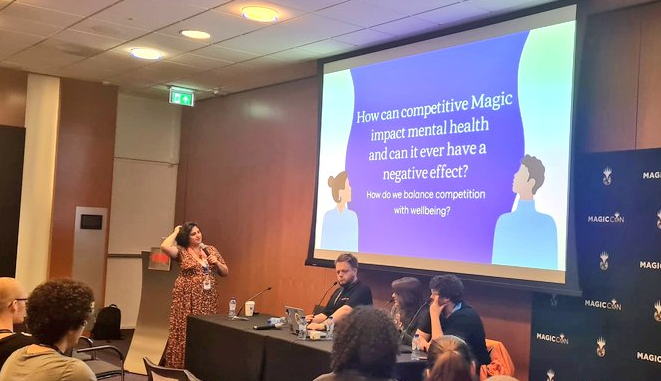
Sahar's Magic and Mental Health panel
Your panel focused on competitive Magic formats and content creation. How do you feel that the conversation about mental health and Magic extends to Commander?
I was a Commander player first and foremost, many moons ago. I picked up Commander in 2015-16. I feel that with Commander, it's a social game, there's a social contract, the Rule 0 conversation. When you all sit at a Commander game, all of you have to have the utmost regard for everyone else to have a good time.
When it comes to mental health, there are two tension points. One is when your playgroup starts leveling up quicker than you can. When I first started playing, we all went from decks that were sort of three to four, to six or seven within a very short timeframe. And then we all tapered back a bit and were like, "What do we enjoy doing?". Now we're in an understanding of how we should be playing and what's important to us.
The second tension point is that there are some Commander players, where to them that's all there is in Magic. And that's fine. Play the Magic you enjoy! But be cognisant that if you want to play a certain way, that may not resonate with other people. This is why I think the Rule 0 conversation is really important.
I think the creators around Commander do a good job. I think it's good to have discourse, but there have been moments where it feels like there's an 'us vs them' mentality. This mentality that Commander players don't care about 60-card formats, and 60-card format players don't care about Commander. I know some players who don't like the competitive aspect. I completely understand that; I quite enjoy it. But I also recognise that when I play Commander, my goal isn't necessarily to win, my goal is to have a good time with my friends. So it's managing your expectations of what you're trying to do.
But I will also say some people fell into Commander because it's the easiest access point, and then that's all they do. Sometimes I'll go, "Have you tried playing Cube? Have you tried playing Limited?" And it can get a bit frustrating when sometimes you speak to Commander players, and they're like "This is all I do." And I'm like "What about X" and they say "I hadn't thought about it in that way, I don't know anyone who plays that" and I say, "We're talking!"
There's only so much time that anybody has, but I think all communities could be better at extending the olive branch between formats.
Where did your interest in mental health and gaming originate?
I've always been interested in how I was viewed in the world and trying to better myself. But I remember being at Nationals in Derby, UK in 2018, and I just was feeling really tense. I remember playing Modern and I was going to the toilet after every round. I thought I'd just drank a lot of water, but I could feel my heart palpitating badly. There were multiple factors; I wasn't in a happy work situation and it was all building and building. I remember thinking I needed to take some time off work. But I was still playing Magic at that point and pushing myself and trying to get better. And then in 2019 I just said sod it, and I quit my job. But I was still playing Magic at that point, and Magic was my way of staying connected while I was traveling, when I got married and while I was doing my Masters. Magic was my way of having a place where I could still feel like I was achieving something and could have positive mental health in that respect, which is why I'm so passionate about it and why I'm now studying it.
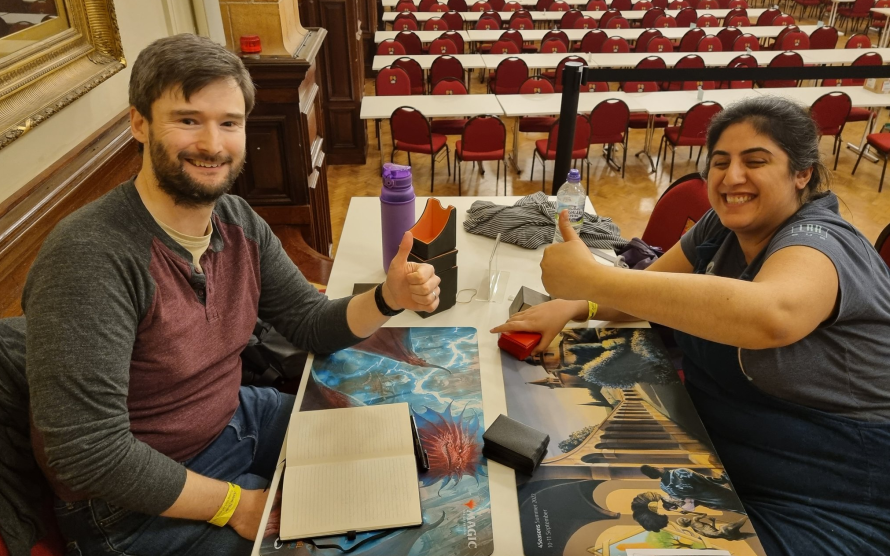
Sahar winning AxionMega Legacy tournament in February 2023
I picked up Legacy in 2019 and I went to GP Bologna. I went undefeated on Day 1, had the time of my life, fell in love with the format, and then COVID-19 hit. I'm doing a Masters on Positive Psychology, of all things, during a pandemic, and I had to stop playing Magic because I couldn't afford it. It just wasn't sensible. I was that person who picked up Animal Crossing during Covid and threw hundreds and hundreds of hours into this world. I became quite fascinated by the ways technology could help people with their mental health because I could see it happening, I was experiencing it firsthand. It helped me recapture myself.
I then bumped into an old friend from university who was doing a PhD in Virtual Reality and I said, "That's amazing!". I was looking into doing a PhD on wellbeing and technology, and he put me in touch with a video games researcher.
I put a proposal together and I've been studying video games, well-being and coping ever since.
For me, Magic has helped me open up and be that person who can support others. I don't want to say Magic saved me, but it allowed me to start understanding the human condition in a way that made me fascinated by the role of games in supporting people through their mental health, through times of difficulty, and what it is about games that support that. I'm looking more at video games and digital games, but by proxy, I'm always fascinated by what Magic can do as well.
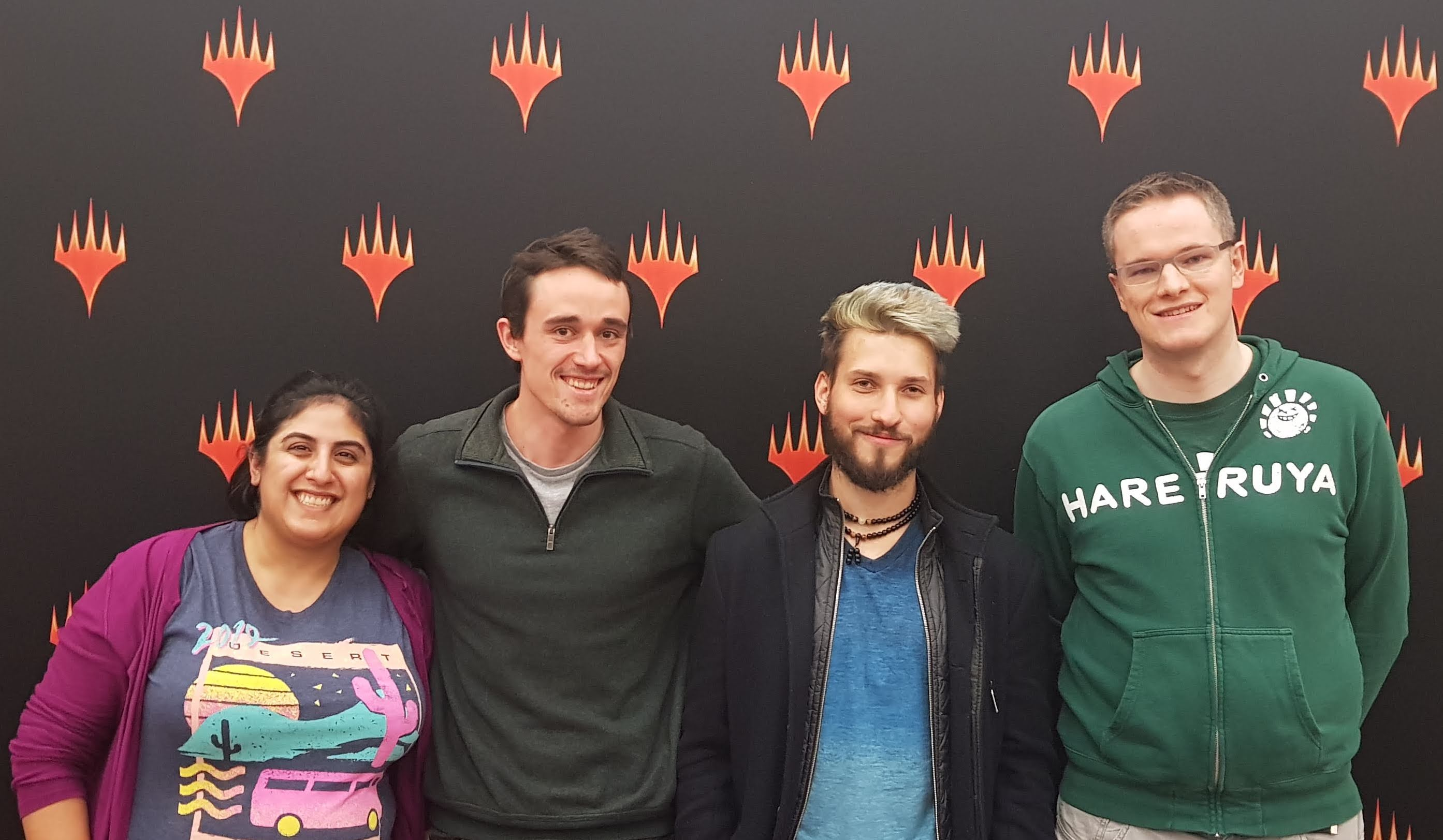
Sahar's 9-0 at Legacy in GP Bologna!
How is your research now feeding into how you're connecting with Magic?
It's interesting because most of the stuff I'm doing is about video games. For me, I now consider myself a player researcher. It's a very unique position; there's only a handful of us out there who are students, therapists or games researchers, who can look at Magic from both angles. When I wrote my first paper, I remember sending it to a friend who was a big grinder, and I said "Hey, we've spoken about addiction in the past, I want you to read what I found out about games aspects that help or don't help players.". He quoted something where I was talking about rewards and grinding, and this notion that you have to keep playing or you'll miss out. He said, "That's me when I was playing World of Warcraft when I now play Magic."
I can see it when I see people talking about X and tying their self-worth to results. I can see the signs of struggle, imposter syndrome and the mental struggle that people do to build their self-image and maintain balance. It's why I lead with compassion first, because as a researcher you see the positive and the negative sides of what gaming can do. With Magic, there are multiple factors at play, and I understand when people say XYZ because I've been through it myself or know others who have, which is an interesting tension point for me. There are moments in my PhD where I've gone, am I doing this work to understand myself more? And there's a percentage of that that's true. If I can, through my research, begin to understand what it is about games that help or don't help people and we can identify some of that, and then I can apply that to my way of looking at Magic, that's kind of cool.
Finally, who's your favourite commander and why?
The ones that I play the most are Kynaios and Tiro of Meletis
Then there's my first-ever commander, who I have a soft spot for. I'm a Boros player at heart, so Agrus Kos, Wojek Veteran
We'd like to thank Sahar for her time and insight into the worlds of competitive Magic, mental health, the New Perspectives grant and hosting a panel at MagicCon. What are some of the ways you look after your mental health as a Magic player? Share your tips and comments below.